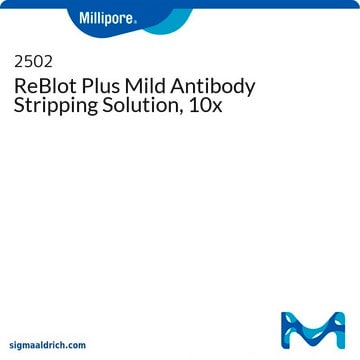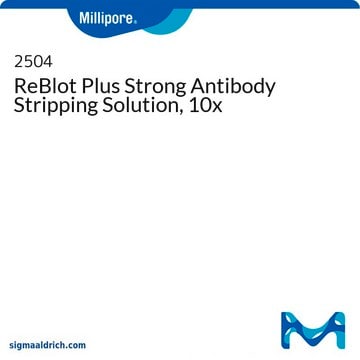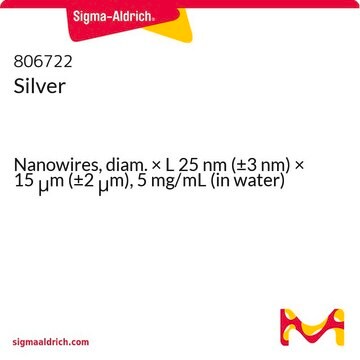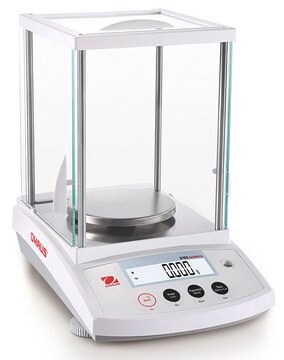WB59
Western-Re-Probe Reagent
This Western-Re-Probe Reagent is validated for use in Immunoblotting.
Iniciar sesiónpara Ver la Fijación de precios por contrato y de la organización
About This Item
UNSPSC Code:
41116133
NACRES:
NA.77
Productos recomendados
Quality Level
form
liquid
manufacturer/tradename
Calbiochem®
storage condition
OK to freeze
shipped in
wet ice
storage temp.
2-8°C
General description
Designed to dissociate and remove antibodies from membrane-bound proteins without destroying antigenic binding capacity. Recommended for stripping chemiluminescent or radioisotopic signals from blots. Not recommended for stripping color-producing Western blots. Supplied as a 5X solution sufficient for stripping 25-30 standard blots.
This Western-Re-Probe Reagent is validated for use in Immunoblotting.
Western-Re-Probe Reagent is specifically formulated to dissociate and remove antibodies from the membrane bound protein without destroying the antigenic binding affinity. The removal of antibodies also removes corresponding chemiluminescence or radioactive signals from the blots. Stripped blots can be probed with new probes.
Application
Immunoblotting (see comments)
Components
5X Re-Probe solution (125 ml)
Warning
Toxicity: Standard Handling (A)
Physical form
Supplied as a 5X solution.
Other Notes
Sufficient volume to strip 25-30 standard blots.
ADVANTAGES
-Immunoblotting analyzed repeatedly with multiple probes
-Saving on hard-to-get reagents and samples
-Correction and re-analysis of unsatisfactory Western Blots
-Saving time spent in gel re-running and transfer processes
PROTOCOL
1- Keep the membrane wet in an appropriate buffer after each probing procedure. Prepare 20-25 ml solution of 1X Western-Re-Probe in water.
2- Incubate the membrane in 1X Western-Re-Probe buffer for 30 min at room temperature (RT) with shaking.
3- Wash the membrane three times in PBST or TBST buffer containing 0.1% Tween-20 detergent. Use a large volume of washing buffer in a tray for the washing step. Each wash cycle involves agitating the membrane 5 min in the washing buffer.
4- Block the membrane and perform immunodetection.
Western-Re-Probe Reagent can be used for stripping and re-probing membranes 2-3 times. Some loss of signal may be noticed after second cycle of stripping and re-probing.
PROTOCOL SUMMARY
1. Incubate membrane in 1X Western-Re-Probe (30 min at RT) with shaking
2. Wash the membrane 3 times in PBST or TBST buffer
3. Block membrane and perform immunodetection
ADVANTAGES
-Immunoblotting analyzed repeatedly with multiple probes
-Saving on hard-to-get reagents and samples
-Correction and re-analysis of unsatisfactory Western Blots
-Saving time spent in gel re-running and transfer processes
PROTOCOL
1- Keep the membrane wet in an appropriate buffer after each probing procedure. Prepare 20-25 ml solution of 1X Western-Re-Probe in water.
2- Incubate the membrane in 1X Western-Re-Probe buffer for 30 min at room temperature (RT) with shaking.
3- Wash the membrane three times in PBST or TBST buffer containing 0.1% Tween-20 detergent. Use a large volume of washing buffer in a tray for the washing step. Each wash cycle involves agitating the membrane 5 min in the washing buffer.
4- Block the membrane and perform immunodetection.
Western-Re-Probe Reagent can be used for stripping and re-probing membranes 2-3 times. Some loss of signal may be noticed after second cycle of stripping and re-probing.
PROTOCOL SUMMARY
1. Incubate membrane in 1X Western-Re-Probe (30 min at RT) with shaking
2. Wash the membrane 3 times in PBST or TBST buffer
3. Block membrane and perform immunodetection
Legal Information
CALBIOCHEM is a registered trademark of Merck KGaA, Darmstadt, Germany
Storage Class
12 - Non Combustible Liquids
wgk_germany
WGK 1
flash_point_f
Not applicable
flash_point_c
Not applicable
Certificados de análisis (COA)
Busque Certificados de análisis (COA) introduciendo el número de lote del producto. Los números de lote se encuentran en la etiqueta del producto después de las palabras «Lot» o «Batch»
¿Ya tiene este producto?
Encuentre la documentación para los productos que ha comprado recientemente en la Biblioteca de documentos.
Nuestro equipo de científicos tiene experiencia en todas las áreas de investigación: Ciencias de la vida, Ciencia de los materiales, Síntesis química, Cromatografía, Analítica y muchas otras.
Póngase en contacto con el Servicio técnico







